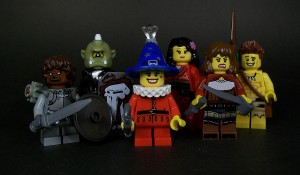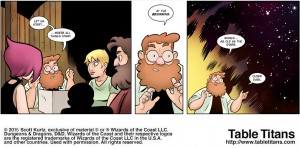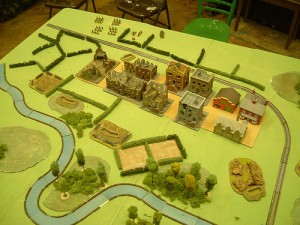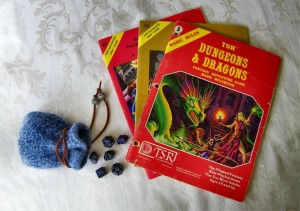I waited for a cab outside a hotel in the slight chill of 1 AM air, having just finished up observing (and playing in) a Live Action Roleplaying Game (larp for short), wherein me and at least forty other people pretended to be locked in a room with an oncoming tide of angry ghosts. So I was still buzzed a bit from the adrenaline high of the adventure’s conclusion, despite the late (early) hour, and figured people-watching while waiting for a cab back to my apartment wasn’t the worst use of my time. There were still many people up, most coming from events like the one I had just attended, many of whom were in costume as witches, knights, and diplomats. There was also, as it happened, a One Direction concert letting out at the same time, so along with the brave adventurers, I found myself watching drunk soccer moms and preteen girls in sparkly band shirts. Other than the age and gender divide, the two groups didn’t seem all that different. They’d both traveled, some farther than others, for a wild weekend surrounded by what they loved. And while there may have been some confused glances all around, there didn’t seem to be any conflicts between the two. Fans are fans, after all.
Walking the halls of GenCon is a bit like a trip to nerd Valhalla. There are old and out of print games and books lining crowded shelves. New developers with fresh games to playtest mingle alongside established developers connecting with the community. Then there’s the community itself, a collected group where you know that, above all, you will have at least one thing in common with any given person: a love of games.
GenCon is the largest game-focused convention in North America, and has been around since 1968. The name (short for Geneva Convention) was an homage to it’s initial space at lake Geneva. It has long since outgrown that location, and is already straining the seams of its current Indianapolis location, with over 60,000 attendees in 2015, when I attended. There is an expected demographic at these sorts of events, and I’ll admit I wasn’t proved wrong; while I don’t have the exact demographics data, most of attendees I saw walking around were white, and most of them were men. However, there were also many parents there with their children, mixed groups of teens, etc. I have to say that the sheer scope of the space was intimidating, at at least part of that was only exaggerated by being a single young woman trying to interview a mostly older male population.
Intimidation aside though, I loved attending. I wish I’d had friends along, but I also talked to a lot of amazing and interesting people, some of whom I’m still in contact with.
I went to GenCon to lay the groundwork for some sociology research. And I came out with a few interesting conclusions, some of which I’ll hopefully be writing more about in their own articles in the future.
1. “Wish Fulfillment” isn’t always the reason for a character
People play certain characters for a number of reasons. Many people on the outside assume that any given tabletop rpg character has to be played for wish fulfillment. You get to be, for all intents and purposes, better than you are in real life, so how could it be anything else? While there is some element of wish fulfillment, and some mentioned that when I was interviewing, it seemed like there was a lot of other stuff to it as well. One guy just liked helping people, and games gave him a more concrete space to do it. Another woman said that she tended to make characters that had exaggerate personality flaws that she felt she needed to deal with, and playing characters with those traits had helped her work through some issues. Even in the examples of wish fulfillment, it was always about being a “bigger, stronger you.” I’ve talked to trans players who have frequently made characters of their gender, and find pleasure in not having to worry about passing. If they were playing and in the closet it gave them a safe space to play with pronouns, as being a character not your gender isn’t that unusual in the gaming world. It was a space to experiment without having to come out.
2. People play games to play games with PEOPLE
The resounding response from attendees was that they gamed to hang out with friends. Everybody had some variations on this, with creative types enjoying acting out a character, or those invested in game mechanics getting to fiddle with math. But everybody I talked to said that they enjoyed gaming because it gave them the opportunity to hang out with friends and family.
This is something I’ve personally experienced as well. I’ve always tended towards being more of a wallflower, and especially in high school, I always felt weird asking to just “hang out” with people, doing nothing in particular. So instead I got into tabletop games. Games offered just enough of a social structure to get me to show up, and I never had to ask if anybody wanted to hang out. I just knew that, if I went to a certain place at a certain time, I’d be able to spend time with people whose company I enjoyed, until a specific time, when everybody would go home. I don’t need to be that regulated now, of course, and part of that is due to the confidence I’ve gained in gaming groups, and I still really like using games as an excuse to get a bunch of my friends together, regularly, in the same room.
That’s not the story for everybody. Some people like sticking closely to a story, others have tabletop games in addition to other group gaming activities (board games or video games, ect). But overwhelmingly it was the first thing anybody said when asked what made games special to them.
Tabletop rpgs are unique social experiences, and the “social” part of that is, in my opinion, and that of many others, one of the most important aspects of what makes a game fun.
3. There’s one main reason people are discouraged from gaming
Overwhelmingly, when asked what kept them from gaming, most said getting a group all together was, frankly, just too hard. While I had most women bring up sexist or toxic members of the community, they said that that didn’t matter as much in terms of stopping them from playing, as they could always leave a less welcoming group to try and find different people to play with. But once you get established with a group, and have lasting friendships with those people, it’s much harder to just leave if the group isn’t able to meet up consistently. So once “real life” starts to get in the way, or members have to move across the country, many groups end up falling apart, and having to restart those social connections from scratch leaves players discouraged.
4. It’s easy to get stuck in a bubble, and that’s not always a good thing
There are definitely toxic aspects to the community, but often they are more easily isolated than in comparable hobbies. The nature of tabletop rpgs often involves finding a group you like and just playing with them. I’ve played with one group of people for more than six years now, and for a majority of my gaming formative years, they were all I had. That meant I wasn’t really part of the gaming community as a whole, despite being heavily immersed in the hobby. It was really easy to have a rich, full gaming life only interacting with people I’d already been interacting with for years. Many who had experienced sexism or other prejudice in the gaming community said that it was never too long lasting. They were either with a group of friends who realized another player’s behavior was unacceptable and excluded that player in the future, or the victim of gross behavior would just leave to find another group, if they weren’t close. This sort of behavior is harder to escape in convention spaces, where female presenters are frequently inundated with death threats for speaking out on controversial topics like Gamergate or sexism in games.
5. Social growth is happening, and it’s going to keep happening
Some games, though, are trying to be more inclusive. Games like Fate Core have always been about trying to make sure there’s a diverse cast in their source material, and through their open licensing of game supplements, they are providing a space for anybody in any situation to design their own game using Fate Core as a base. Even the big companies, like Paizo (who makes Pathfinder), have been trying to make large steps towards having a vibrant cast of “iconic” characters, going to far as to have a trans woman as their example of an ideal shaman, where many game systems still consider trans identities a joke or a only a cursed magic item. Of course none of these things are perfect, but with more of a push being made even by larger companies, people are listening. One woman I talked to mentioned how she had realized how done she was with “the chainmail bikini thing.” If she was interested in some new game a developer was trying to push on the vendor floor, and she noticed art that she didn’t find tasteful, she would pass it by. Basically, there were better options for her now that she could always find something good that didn’t make her uncomfortable.
Developers that try to aid in this sort of diversity though, are often criticized by reactionary groups. Many have decried Paizo for falling to “the SJWs.” It was refreshing though, to see these accusations answered by the Paizo staff with derision, which is about all they deserve. Having a team stand up for their issues is something I hope we only see more of.
So that’s an overview of what I picked up on at GenCon, and as I said, hopefully we’ll be able to dive more into these topics soon. Have you noticed anything like what I’ve listed above in your gaming life? Comment below, I’d love to hear about it!






